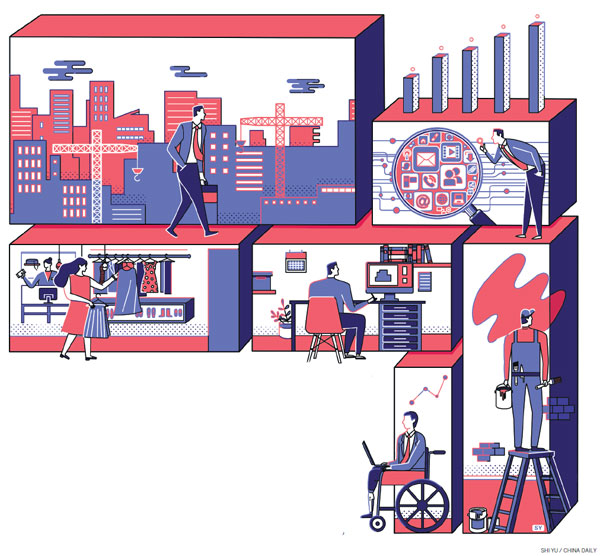New industries and businesses will be governed in a prudent way to help expand employment as China places job creation at the top of its agenda amid downward pressure on growth.
 |
|
Job creation is priority as entrepreneurship and innovation seen as best options to provide key groups with opportunities.
|
That was one of the decisions made at a State Council executive meeting, which was presided over by Premier Li Keqiang on Wednesday. The meeting sought to encourage mass entrepreneurship and innovation to create employment opportunities and help key groups find jobs, said a statement issued after the meeting.
Supportive policies were reiterated at the meeting while key groups, such as college graduates, migrant workers and workers transferred from overcapacity cuts, will be given favorable policies to find work, the statement said.
Professional and market-oriented innovation spaces and demonstration zones should be promoted to provide support to high-level talent to start their businesses and upgrade traditional industries, the statement said, adding that more jobs should be created when new economic drivers are cultivated to offer more positions.
Employment is one of the most vital economic indicators for the premier and the central government. A special meeting was convened by the State Council in May last year to ensure these key groups find new jobs.
Facing downward pressure on economic growth in recent years, China has placed employment as a top priority and taken more proactive policies, which will help the country create more than 13 million jobs in urban areas each year, the statement said.
There is a huge demand for jobs but employment is also facing many structural problems, which calls for more intensified efforts to combat unemployment, it said.
Mass entrepreneurship and innovation should be encouraged to create jobs, while the country will roll out more measures to support migrant workers in starting their own businesses in their hometowns, the statement said.
Economic growth and employment can complement each other, because a stabilizing economy can support employment while full employment, in return, can boost economic restructuring and industrial upgrading, the premier told the meeting.
New businesses are emerging and the government should take a prudent path to manage these new economic drivers that can also contribute to an increasing number of employment opportunities, the premier said.
“People will live a well-off life when most people in this country have jobs and income. The country will be stronger as well,” he added.
The first eight months saw more than 10 million jobs created for urban residents, according to figures by the Ministry of Human Resources and Social Security.
The unemployment rate in urban areas is also at a record low, which is accredited by experts to the contribution of new industries and businesses.
Industrial restructuring and upgrading has provided new momentum for employment, especially the service sector that made up 43.5 percent of the country’s GDP last year, said Li Chang’an, a professor of public management at the University of International Business and Economics.
New industries, such as internet-based sectors, are new sources for job seekers with millions of people making a living working for these industries, he said.
For example, express delivery services employ more than 2.6 million people around the country, thanks to thriving online shopping, he added.
Meanwhile, new industries offer alternatives to help disadvantaged groups. Last year, 160,000 people with disabilities ran online shops at Taobao.com to earn 12.4 billion yuan ($1.98 billion) in revenue, according to a report jointly released by the China Disabled Persons’ Federation and Alibaba Group.
People with disabilities are sometimes wrongly believed to be lacking the skills to make money, said Xia Xueluan, a professor of sociology at Sanya University in Hainan province.
“But online shopping has made a difference for them and they should be shown respect to be brave enough to embrace the new opportunities,” Xia said.
New industries and jobs should be given more time to develop and mature, which demands governmental support such as that decided at Wednesday’s meeting, Xia added.
In addition, the meeting also decided to improve vocational education that can meet new demands for the job market, while labor and social security policies should keep in line with the changing labor market. Supervision will be further reinforced over the labor market and the protection of legitimate rights for job seekers.
